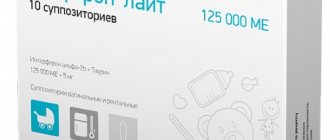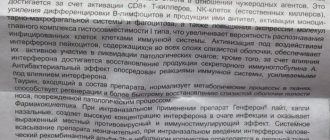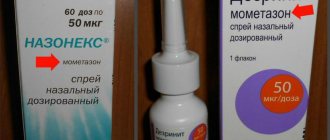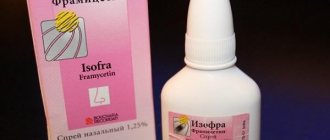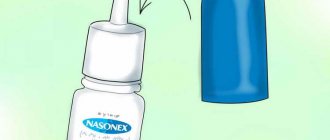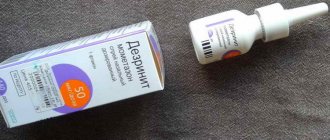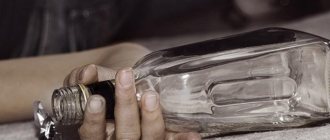Release form and composition
Dosage form - homeopathic nasal spray: light yellow or colorless, slightly opalescent or transparent, odorless (in a cardboard box there is 1 brown glass bottle, equipped with a polypropylene dispenser sprayer and a protective cap with tamper evident, containing 20 ml of nasal spray, and instructions for use of Euphorbium compositum Nazentropfen C).
Active ingredients in 100 g nasal spray:
- euphorbium D4 – 1 g;
- pulsatilla pratensis / pulsatilla (pulsatilla pratensis / pulsatilla) D2 – 1 g;
- luffa operculata D2 – 1 g;
- hydrargyrum bijodatum / mercurius bijodatus (hydrargyrum bijodatum / mercurius bijodatus) D8 – 1 g;
- mucosa nasalis suis D8 – 1 g;
- hepar sulfuris / hepar sulfuris calcareum (hepar sulfuris / hepar sulfuris calcareum) D10 – 1 g;
- Argentum nitricum (argentum nitricum) D10 – l g;
- sinusitis-nosode D13 – 1 g.
Auxiliary components: purified water, sodium hydrogen phosphate dihydrate, sodium dihydrogen phosphate dihydrate, sodium chloride, benzalkonium chloride solution.
Pharmacological properties
Euphorbium compositum for children (reviews and instructions for the drug indicate the multicomponent nature of the drug) is a homeopathic remedy made on the basis of plant components. The medication exhibits reparative and anti-inflammatory properties, while suppressing allergic reactions.
The product has high activity against rhinitis of various origins. In this case, the effect of the drug is due to the herbal components included in the spray.
The drug has a specific effect on the main functions of the mucous membranes of the nose, as well as its paranasal sinuses. At the same time, restoration and regulation of metabolic processes in this area are noted.
The process leads to a decrease in pressure in the area of the frontal system, which, in turn, helps to restore the natural functions responsible for normal nasal breathing and moisturizing the nasal mucosa.
In case of chronic disease, the active components of the drug lead to reactivation of the epithelial layer and help moisturize the dry nasal membrane.
The therapeutic effect of the drug is observed after 3-4 applications. At the same time, there is a restoration of normal moisture in the nose and its paranasal sinuses.
The drug does not have an effect similar to vasoconstrictor drops and can be used as an independent treatment.
Euphorbium compositum Nazentropfen S, instructions for use: method and dosage
Homeopathic spray Euphorbium compositum Nazentropfen S is intended for nasal use.
Recommended dosage regimen:
- children 4–6 years old: 1 injection into each nasal passage 3–4 times a day;
- children 6–12 years old, adolescents and adults: 1–2 injections into each nasal passage 3–5 times a day.
Immediately before using the spray for the first time, remove the tamper evident ring from the protective cap of the spray dispenser and remove the cap from the bottle. Then you need to squeeze the container several times (as when using a pump) until a light cloud appears, insert the hole into the nasal passage and inject.
Indications for use
Euphorbium compositum is intended for the treatment of rhinitis in children and can be used in conjunction with other similar drugs. According to reviews from parents, the medication, when used in combination with other drugs, enhances the effectiveness of both drugs.
Indications:
- various forms of rhinitis - bacterial, allergic, atrophic, viral;
- development of hay fever – hay fever;
- chronic course of the atrophic form of the runny nose - ozena (as part of complex treatment);
- allergic and vasomotor rhinitis caused by taking medications - drug rhinopathy;
- presence of adenoids;
- acute and chronic form of otitis;
- inflammatory processes in the area of the Eustachian tube - tubo-otitis.
Complex treatment of diseases is prescribed only by the treating specialist, taking into account various factors - the type of disease, the nature of its origin and the severity of the pathology.
special instructions
Nasal spray against the background of thyroid pathologies can only be used under close medical supervision.
It should be taken into account that treatment with homeopathic medicines may be accompanied by a temporary exacerbation of existing manifestations of the disease (primary deterioration). In such cases, patients should stop using Euphorbium compositum Nazentropfen S and consult a doctor for advice.
The development of unwanted side reactions is a reason to consult a doctor for advice.
Immediately after using the spray, it is important to close the bottle.
Impact on the ability to drive vehicles and complex mechanisms
Therapy with a homeopathic medicine does not affect the driving of motor vehicles and other vehicles, work with moving mechanisms, the functions of a dispatcher and operator, as well as the performance of other potentially hazardous activities that may require concentration and high reaction speed.
Analogs
The selection of analogues should not be done independently; it is better to consult a doctor who can provide professional assistance. So, you can choose a similar medication from the following list:
- Isofra. Antibiotic for local use in the treatment of ENT diseases. Effectively used to combat bacteria that cause infectious and inflammatory processes in the upper respiratory tract. Indicated for rhinitis, sinusitis, rhinopharyngitis.
- Eucasept. The drug has an anti-inflammatory and antiseptic effect. The product contains exclusively plant components - eucalyptus oil, fir oil, peppermint oil, azulene, thymol. When using the medicine, the functions of the nasal mucosa are restored, which provides treatment for acute and chronic rhinitis.
- Pinosol. Available in several forms - nasal ointment, spray, drops. The drug relieves swelling and inflammation of the nasal mucosa, thins viscous mucus for easy rinsing, and kills yeast and mold fungi. Indicated for rhinitis and inflammatory diseases with dry mucous membranes.
- Evamenol. A nasal ointment consisting of menthol and eucalyptus oil facilitates nasal breathing and protects the mucous membrane during colds. Due to its natural composition, the drug is approved for pregnant and breastfeeding mothers and children over 2 years old. In addition, the product is contraindicated only if you are sensitive to the components, and the list of side effects consists of short-term irritation.
- Salin. The drug is a nasal spray that effectively fights inflammatory diseases of the nasal cavity. The product facilitates nasal breathing, thins thick mucus, softens crusts, removing secretions from the respiratory tract. Before use, you must read the instructions to avoid complications.
- Pinovit. Indicated for use in acute and chronic rhinitis of any origin, except allergies, nasopharyngitis, laryngotracheitis, infectious processes of the nasopharynx. The composition contains oil of mountain pine, peppermint, eucalyptus, which provides anti-inflammatory, decongestant, and antibacterial effects.
Natural components in the composition of the drug
The main active substances in the medicinal solution are extracts from medicinal plants, organic substances and trace elements:
- Spurge. The juice of the plant relieves inflammation and reduces tissue sensitivity, providing an anesthetic effect. The plant tones blood vessels, improves trophism at the cellular level, and stimulates the processes of restoration of anatomical structures in the nasopharynx.
- Dream-grass. The main medicinal property is antimicrobial. The plant has a detrimental effect on pathogenic microflora, preventing the reproduction and formation of colonies. Relieves headaches, neuralgia. It has sedative properties and has a calming effect on the entire body.
- Luffa (tropical plant of the pumpkin family). The main therapeutic function is lymphatic drainage. Lymphatic drainage is extremely important for adenoids, it reduces the inflamed organ. The plant stimulates blood circulation at the local level, cleanses the mucous membrane of plaque and pathological exudate. Reduces sensitization (hypersensitivity) to allergens.
- Hepar sulphur. These are crushed oyster shells. Prevents the attachment of bacterial flora and suppuration of tissues and mucous membranes. It has a calming effect on the inflamed tonsil, relieves redness.
- Mercury dioxide. It has an irritating effect on the mucous membrane, accelerates the process of resorption of inflammation, and has antimicrobial properties.
- Silver nitrate. Suppresses the vital activity of pathogenic microflora, sterilizes the wound surface, reduces inflammation, and has an astringent effect.
How to use the spray correctly
Euphorbium compositum nazentropfen (only after reading the instructions) it is recommended to administer 1-2 injections of the drug into each nasal passage of the patient, three to five times throughout the day. The optimal dosage for young patients under six years of age is one injection three or four times a day.
In acute cases of pathology, the dosage of the drug can be temporarily increased to six applications per day. The medicine is injected directly into the nasal passage, and a convenient dispenser ensures correct dosing and uniform distribution of the spray.
Before nasal administration of Euphorbium, it is recommended to first clean the nasal cavity of accumulated mucous secretions. This can be done by thoroughly blowing your nose or rinsing it. To clean the nose of young children, you can use a special aspirator.
How long treatment should last is decided individually. Due to the fact that this drug does not cause addiction and the development of taphylaxis, it can be used for a long time. This will not only not cause the slightest harm to health, but will also help to significantly increase the effectiveness of treatment, as well as strengthen local immunity. Many patients noted that with long-term use of the spray they began to suffer significantly less from viral-bacterial and respiratory diseases and colds.
Euphorbium compositum nazentropfen is easily combined with other medications, and therefore can be used as a component of complex drug therapy prescribed by the attending physician in accordance with a specific diagnosis!
Precautionary measures
Overdose
In the specialized medical literature, cases of overdose with Euphorbium Compositum spray are not found. But experts have developed special instructions for the use of this drug. So, during the period of therapy, due to taking this medication, an exacerbation of the symptoms of the underlying disease is possible - doctors call and qualify this as a primary deterioration. In this case, there is a qualified recommendation - to immediately stop therapeutic treatment and promptly contact a homeopath for professional advice.
The pharmaceutical drug does not affect a person’s ability to drive a car or any other vehicle; it does not affect the ability to concentrate for a long time or work with mechanisms that are potentially life-threatening.
Analogs
Analogs of homeopathic nasal aerosol include medicines that have the same international nonproprietary name (INN). These include Pinovit, Boromenthol and Pinosol. Also similar is Adrianol for children. It is not recommended to independently replace a pharmaceutical drug that was prescribed for therapy by a qualified specialist, since a number of side effects can be caused due to the specific use of each of them.
For children
This homeopathic remedy can be prescribed and used for children over 4 years of age. This is explained by age-related physiology - by this time in children the mucous membrane of the nasal passage, additional sinuses and nasal cavity is already fully formed. The exact dosage for pediatric therapy is described in detail in the corresponding section of the “Instructions for Use”.
With alcohol
The described homeopathic remedy has no systemic effects. At present, special clinical studies have not been conducted to determine the interaction of the biologically active components of this medicinal product and components of alcohol. In this regard, in order to avoid the adverse effects of therapy or the appearance and progression of any side effects from the treatment, drinking alcohol during a conservative course of rehabilitation is not recommended.
Pregnancy and lactation
Prescription of the pharmaceutical drug during pregnancy and breastfeeding is allowed. But you should know that so far there are no reliable clinical studies regarding the effect of the homeopathic components of the aerosol on the body of the unborn child, infant and mother.
Conditions of sale and storage, expiration date
This medicine is sold without a prescription at pharmacy kiosks. This homeopathic medicine should be stored in a dry place, out of reach of children. It must also be protected from light and have a constant temperature within 15 - 25 degrees Celsius. The expiration date is indicated on the packaging and is 5 years.
Side effects
It is possible to develop allergic reactions due to hypersensitivity to the components of the drug.
In very rare cases, after the drug has been ingested, the nasal mucosa can be prevented from forming liver and hypersecretion. In such episodes, the stagnation of the medicinal task is particularly important.
In very rare episodes in patients with pre-existing bronchial asthma, taking the drug can cause bronchospasm due to the presence of benzalkonium chloride in the drug.
Possible negative reactions during treatment
In children, during treatment of adenoids, there is a possible risk of developing local allergic reactions. In the area where the solution is applied, irritation of the mucous membrane, burning, increased hyperemia, and itching are observed. Rashes are not recorded often. Hypersecretion may increase, which is manifested by a profuse runny nose.
If one of the symptoms appears, you should stop using the product and consult a doctor, especially if this concerns a child under 3 years of age.
It is extremely rare that children may develop bronchospasm and an attack of suffocation. Such signs are observed in young patients who are predisposed to bronchial asthma.
Sometimes during the first days of treatment there may be a slight increase in the production of mucus in the nose. This is normal and does not require discontinuation of therapy.
The issue of using the solution in pregnant women remains unstudied. It is unknown how the components of the drug affect the growth and development of the fetus. Therefore, medication during pregnancy is prescribed only according to strict indications, taking into account all possible risks for both the child and the woman. The spray is also not prescribed for nursing mothers.
No cases of overdose with homeopathic medicine have been identified.
Euphorbium is contraindicated for people with high hypersensitivity or individual intolerance to the components.
According to the instructions for use, Euphorbium Compositum for adenoids is safe for children and weakened patients. No dose adjustment is required when treating elderly people with tonsillitis. The drug does not have a toxic effect on internal organs and systems and does not interfere with their functionality. Euphorbium prevents the development of severe complications in children - inflammation of the middle ear and the risk of developing deafness, respiratory arrest during night sleep, calling into question the need for surgical removal of the tonsils.
Composition of the drug Euphorbium
The active component of the drug Euphorbium is Euphorbium D4 (resin-bearing spurge). Also, the therapeutic effect of the product is provided by other components. Each bottle of the drug contains one gram of them. Let's list them:
- Pulsatilla pretensis D2;
- covered luffa D2;
- mercury biiodate D8;
- domestic pig nasal mucosa;
- lime sulfur liver;
- silver nitrate;
- sinusitis nosode.
However, these are not all components of the medicine. The composition contains some excipients that are also important. Euphorbium compositum, a remedy for sinusitis, contains:
- 20 mg benzalkonium chloride solution;
- 829.2 mg sodium chloride (table salt);
- 62.8 mg sodium dihydrogen phosphate dihydrate;
- 20 mg sodium hydrogen phosphate dihydrate;
- 91 g purified water.
During pregnancy
During pregnancy, the choice of medications for the treatment of pathologies such as sinusitis or runny nose requires great care. Indeed, at this time, women are responsible not only for themselves, but also for their unborn child.
Among the most popular, and at the same time safe, drugs used by pregnant women is the homeopathic medicine “Euphorbium compositum”.
This German-made drug is considered gentle, since it does not irritate the nasal mucosa, does not provoke vasoconstriction, and in general its use eliminates many possible problems that can threaten when using other means. Expectant mothers can use this medicine for chronic rhinitis. At the same time, its effect does not become weaker with long-term use, as, unfortunately, happens with many other drugs.
But, despite all the advantages of this medicine, a mandatory consultation with your doctor is required. The fact is that a woman may simply not know about all the nuances of taking this drug; moreover, it is advisable to clarify its dosage, as well as the frequency of use. Typically, pregnant women are prescribed spray and drops three to six times a day, and injections once a week.
Price in pharmacies in Moscow, St. Petersburg, regions
Prices for the drug may vary depending on the region and area of its sale. You can purchase the medicine over the counter at any public or private pharmacy.
| Sales area/region | Shape, volume | Price |
| Moscow, Moscow region | Spray, 20 ml | 400-1068 rub. |
| Saint Petersburg | Spray, 20 ml | 420-978 rub. |
| St. Petersburg (suburbs) | Spray, 20 ml | 413-1035 rub. |
| Leningrad region | Spray, 20 ml | 392-765 rub. |
| Novgorod region | Spray, 20 ml | From 430 rub. |
Before using Euphorbium compositum in children, you should consult with a qualified specialist and read the instructions for use of the medication. In addition, it is recommended to study reviews from parents.
Article design: Vladimir the Great
Contraindications and side effects
Like any medicine, this homeopathic remedy has its contraindications. Thus, it is not prescribed to patients with increased individual sensitivity to individual components of this medicine. Another reason to refuse the drug is hereditary or acquired during life or previous treatment intolerance to the active components of this drug. Children under 4 years of age also fall under the category of contraindications. This is explained by the fact that to date, clinical data that inspires confidence in its reliability have not yet been obtained regarding the nasal spray for this age category of potential patients. Euphorbium Compositum is used with extreme caution for diseases of the thyroid gland - this is due to the fact that one of the components contains iodine.
Also, the drug Nazentropfen S has side effects. The aerosol product Euphorbium compositum is generally well tolerated by the body of most patients, without causing pronounced side effects during the course of treatment. But at the same time, in the specialized literature there are rare episodes in which homeopaths described the adverse effects of taking this drug that affected individual patients. Thus, conservative sanitation became the cause of allergic reactions: in some it was manifested by dermatological rashes of varying types and degrees of intensity, and in others it was skin itching or vascular edema. Some patients noted a burning sensation of the skin.
There are descriptions of complaints of increased salivation. Patients prone to bronchial asthma sometimes suffer from bronchospasm.
If any form of side effects develops, it is important for each patient to immediately stop taking the pharmaceutical medication and immediately inform the treating homeopath about this - he will give qualified advice and take individual measures.
Side effects
Euphorbium compositum for children (reviews of the product warn about the possible development of negative reactions) can be prescribed either by a treating specialist or purchased independently.
In most cases, the drug is well tolerated by children, but occasionally adverse reactions may occur due to the degree of sensitivity to the components of the drug or violation of dosage rules.
Side effects:
- development of allergic reactions in the form of redness, nasal congestion, burning sensation, swelling in the area of the vascular system;
- excessive salivation;
- development of rare episodes of bronchospasms.
If symptoms persist due to the development of side effects, as well as if other signs not noted in the instructions develop, it is recommended to stop taking the drug and consult a specialist.
Euphorbium composition
The medication contains 8 substances. Let's look at some of them:
- Euphorbia resiniferous. A plant actively used in folk medicine. Has a powerful bactericidal and anti-inflammatory effect;
- meadow lumbago. Valued for its antimicrobial, anesthetic, antispasmodic properties;
- luffa laxative. Contains vitamins, folic acid, fiber, iron. Included in many products intended to treat diseases of the respiratory system;
- Mercury diiodide. A strong antiseptic prescribed in small quantities for chronic purulent pathologies of the ENT organs;
- silver nitrate. Used in medicine since ancient times. Destroys the enzyme systems of pathogenic microorganisms, causing their death. Has an astringent, antibacterial, cauterizing, cleansing effect;
- extract from the mucous membrane of the pig's nasal cavity. It is used for prolonged rhinitis, frontal sinusitis.

